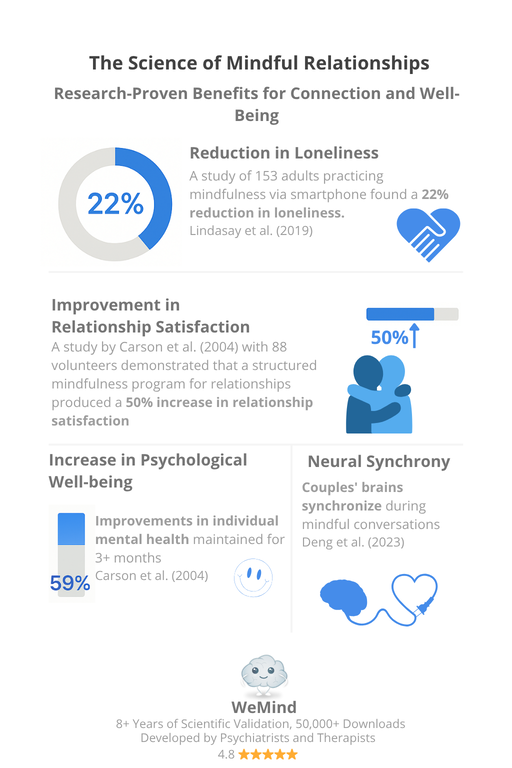Discover how we can strengthen our emotional connection and communication through scientific mindfulness practices.
Have you ever caught yourself thinking that you can’t “turn off your mind” even when you’re with the people you love most, feeling a lack of deeper emotional connection?
If you’re like most professionals we know, you’ve probably experienced this situation: you come home after an intense day at work, but your mind continues processing pending tasks, worries, and decisions. Even when physically present with your family or friends, part of you is still “at the office” or trapped in thoughts.
This disconnection isn’t just frustrating – it’s silently eroding the quality of our most important relationships, impacting relationship communication, emotional health, and overall mental well-being.

The Science Behind Emotional Connection and Relational Well-Being
Recent research reveals impressive data about how our fragmented attention affects our relationships. A study by Lindsay et al. (2019) with 153 adults demonstrated that smartphone-based mindfulness practices reduced loneliness by 22% and increased meaningful social interactions.
But what do “meaningful social interactions” mean? Imagine coming home and, instead of just waving to your partner while checking emails, you have a genuine 5-minute conversation about the day, looking into each other’s eyes. Or, instead of just supervising your children playing, you sit on the floor, actively participate in play for 10 minutes, laughing and truly connecting. These small but powerful interactions add up and build deep emotional connection.
Other studies corroborate the importance of mindfulness. For example, research by Lahtinen et al. (2023) with 561 university students and staff showed that mindfulness can significantly reduce stress and depression, crucial elements for emotional intelligence and dealing with relationship stress and anxiety.
What Really Happens When We Practice Mindfulness in Relationships?
When we apply mindfulness techniques in our interactions, three fundamental neurological transformations occur, proven by neuroscience:
1. Increased Neural Synchrony
Neuroimaging studies show that couples who practice mindfulness develop greater theta interbrain synchrony – in other words, their brains literally “synchronize” during conversations, creating deeper understanding and improving relationship communication.
2. Reduced Emotional Reactivity
Regular mindfulness practice decreases amygdala activation (fear/stress center) and strengthens the prefrontal cortex, allowing more balanced responses in moments of tension and contributing to emotional health.
3. Expanded Empathic Capacity
Mindfulness activates neural networks associated with compassion and theory of mind, improving our ability to understand and connect with others’ emotions, strengthening deep connection and emotional intelligence.
From Theory to Practice: WeMind Method Techniques to Transform Your Relationships
We don’t need hours of meditation to reap these benefits. WeMind method techniques are designed to fit into our busy routine, making daily mindfulness a reality.
Technique 1: The Conscious Pause
Before responding in a difficult conversation, whether with a colleague, friend, or family member, take a pause of 3 conscious breaths. This micro-practice, taught in WeMind, activates our parasympathetic nervous system, allowing more empathetic and less impulsive responses, which is vital for relationship communication.
Technique 2: Listening with Total Presence
During important conversations, practice placing 100% of your attention on the person in front of you. Notice when your mind wanders to tasks or worries, and gently return focus to the present moment, a fundamental technique for daily mindfulness. Imagine your child telling you about their school day: instead of just listening, you lean in, ask questions, and really absorb every word, strengthening the family relationship.
Technique 3: Active Compassion
When irritation or impatience arises, visualize the person as someone who, like us, is doing their best with the emotional resources available at that moment. This active compassion practice, an integral part of the WeMind method, helps reduce relationship stress and cultivate understanding.
The Mindfulness-Based Relationship Program: Proven Results
A controlled study by Carson et al. (2004) with 88 volunteers demonstrated that a structured mindfulness program for relationships produced:
50% improvement in relationship satisfaction, indicating greater happiness in relationships
- 59% increase in individual psychological well-being, contributing to each individual’s mental health
- Significant reduction in conflicts and misunderstandings, enhancing relationship communication
- Benefits maintained for at least 3 months after the program, showing the sustainability of meditation practice for relationships
The most impressive part? These results were achieved with short sessions and practices that fit into participants’ routines, proving that mindfulness is accessible.
Why Small Moments Generate Great Transformations?
Neuroplasticity – the brain’s ability to form new connections – doesn’t require hours of practice. It responds to consistency, not duration.
Five minutes daily of mindfulness applied to relationships can:
- Increase the quality of family interactions, like having a more present conversation with your teenager about the future, or a family dinner where everyone is truly engaged
- Improve workplace communication, transforming tense meetings into productive and collaborative discussions
- Develop greater patience and understanding with clients, dealing with dissatisfaction or challenges more calmly and assertively
- Strengthen emotional connection with your partner, creating moments of genuine intimacy even amid the rush
Your Transformation Journey Starts Now
Let’s imagine what it would be like to come home and be truly present for our family and friends. Let’s visualize conversations where we listen with total attention, respond with patience, and connect genuinely.
This isn’t a fantasy – it’s the natural result of scientifically validated mindfulness practices, adapted to our reality.
The First Step is Always the Most Important
If you’ve made it this far, it’s because you recognize that your relationships deserve the same dedication and excellence you apply to your professional career.
WeMind was developed specifically for people like you: intelligent professionals who value science-based results but need solutions that adapt to the reality of a busy schedule.
With over 8 years of experience and scientific validation from psychiatrists and therapists, our platform offers mindfulness techniques for relationships in sessions of just a few minutes, designed to generate real and lasting transformations in our mental health, emotional well-being, and quality of life.
🎯 Ready to strengthen your relationships with just a few minutes of mindfulness per day?
Download WeMind for free and start your transformation journey today.
Join over 50,000 people who have already discovered how meditation for relationships and mindfulness for family can revolutionize their personal connections and relationship communication.
Rating: ⭐⭐⭐⭐⭐ 4.8/5 | Available in 3 languages | Developed by experts

References
Carson, J. W., Carson, K. M., Gil, K. M., & Baucom, D. H. (2004). Mindfulness-based relationship enhancement (MBRE) for couples: An uncontrolled pilot study. Journal of Marital and Family Therapy, 30(3), 333-345.
Lahtinen, A., Koskinen, S., Kärkkäinen, S., Lipsanen, J., Kinnunen, S. M., & Lappalainen, R. (2023). Effectiveness of a smartphone-based mindfulness intervention for university students and staff: A randomised controlled trial. Behaviour Research and Therapy, 161, 104245.
Lindsay, E. K., Young, S., Smyth, J. M., Brown, K. W., & Creswell, J. D. (2019). Acceptance lowers stress reactivity: Dismantling mindfulness training in a randomized controlled trial. Psychoneuroendocrinology, 87, 63-73.





